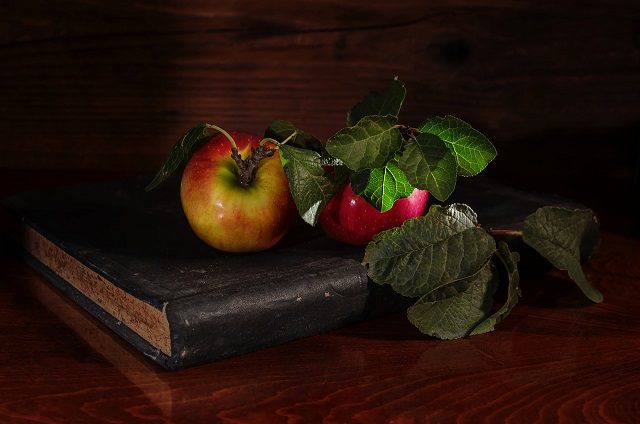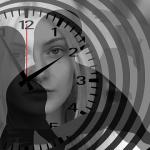For the past several years my upper-division (juniors and seniors) classes have included an ongoing writing assignment that I call the “Intellectual Notebook.” Students are required to make at least one (preferably two) entry of 750 words or so per week in which they are to select a portion of an assigned text as the jumping off point for an open-ended reflection on what the passage makes them feel and think about, as well as what connections they can make. I describe my reasoning behind the assignment in the course syllabus as follows:

The intellectual notebook is an ongoing writing assignment that will allow you to keep an ongoing written record of your intellectual engagement with the course materials this semester . . . The idea behind the notebook grows out of the conviction that rich thinking and good writing are bound up together: your ideas about the books and issues of the course will grow more sophisticated when you “write through” your thoughts.
A former student who wrote three notebooks for me in different classes during his time at the college wrote the following testimonial in the last entry in his final notebook:
Speaking from three journals worth of experience, I can say with some authority that this is an unequivocally valuable exercise. One cannot fake engagement with the texts in this medium; one cannot hide out in the course when a project like this is required.
My own testimonial is that this assignment has, over the past several years, produced the most interesting, insightful, honest, and beautiful student writing that I have read in a quarter century of college teaching. This past week’s entries just added to the excellence.
The required notebook entries in my Philosophy of Knowledge class last week were to focus on “On Presumption” and “On Experience,” two lengthy and important essays from the latter part of Michel de Montaigne’s monumental Essais. I have written frequently on this blog about my love of Montaigne, both as a philosopher and a human being; I mentioned a couple of weeks ago that a Protestant pastor told me in a comment on a recent blog post that his spiritual development and maturation owes as much to Montaigne as to the Gospels. Two of my students chose the following passage from “On Experience” to write about:
We are great fools. “He has spent his life in idleness,” we say; “I have done nothing today.” What, have you not lived? That is not only the fundamental but the most illustrious of your occupations. “If I had been placed in a position to manage great affairs, I would have shown what I could do.” Have you been able to think out and manage your own life? You have done the greatest task of all . . . To compose our character is our duty, not to compose books, and to win, not battles and provinces, but order and tranquility in our conduct. Our great and glorious masterpiece is to live appropriately. All other things, ruling, hoarding, building, are only little appendages and props, at most.
There is nothing so beautiful and legitimate as to play the man well and properly, no knowledge so hard to acquire as the knowledge of how to live this life well and naturally; and the most barbarous of our maladies is to despise our being.
My twenty and twenty-one year old students applied Montaigne’s reflections, for better or for worse, to their millennial concerns. Jack (I have changed my students’ names), for instance, wrote:
- I have always enjoyed the question if money was no option what would your occupation be? . . . The few people that can give a truly honest and individual answer are those that are converging to the life that Montaigne suggests to be most fulfilling. So let us stop chasing that which is fleeting and that which is arbitrary yet instead invest ourselves in the here and the now. Let us come to know ourselves rather than the person we are pressured to be. When we can master ourselves, not in controlling desires or limiting actions, but in knowing what makes us live, we can begin to extinguish the dumpster fires of nonsense and worry that the world throws at us every day.
Brittany has revealed in her notebook her struggles with OCD and other perfectionist tendencies since early childhood; she expanded on that at the beginning of this reflection.
- The importance of accomplishment has been impressed upon me many times over since I first enrolled in school. Possessing an obsessively competitive spirit at a young age, I glorified and reveled in the identity of the “overachiever” archetype. My desire for superiority was so delusional and uncompromising that I refused to recognize the value of any activity I did not already possess a natural aptitude for. Though I have since (slowly and begrudgingly) accepted my limitations and “mellowed out,” the standards to which I compare myself are largely similar. Now that I am older, the model of behavior that I and many of my peers seem to aspire to is the overachiever’s sinister cousin: the career-driven, productive workaholic. Even beyond my peers, our individualistic American culture as a whole has idealized ambition, efficiency, and competition. There exists a disturbingly romanticized vision of the sleep-deprived but passionate soul who is able to successfully prioritize his or her career, work, and productivity over self-care and personal interests. As someone who is still uncertain about her career path and who chose a liberal arts education over what would commonly be considered “useful” degree programs, I often feel as if I have made inadvisable choices and have failed to cultivate the proper ambitions. Along with most others I know, I feel immense guilt and dread if I do not have a “productive” day.
What could a reclusive, 16th century French essayist and philosopher have to say to a brilliant young woman seeking to understand herself and find her path through a world that defines “success” in ways that often are physically and psychologically destructive?
- Montaigne offers a radically different perspective on what an ideal lifestyle should look like. It is in the manner in which we conduct ourselves, not in our achievements, that Montaigne places value. Submitting to Nature, embracing life’s pleasures, accepting our human limitations, and finding order in common ways of living are all far more worthwhile endeavors than maximizing productivity and ambition at the expense of chief human good . . . This outlook is so foreign to the cultural sentiment I have become accustomed to that it seems revolutionary.
The question, of course, is whether it is truly possible to live such a life?
- Is Montaigne’s model of living feasible? It requires both moderation and the ability to “view both good things and bad things sanely,” qualities many people do not possess. Moderation, though ideal, is impossible to perfect due to our various weaknesses. Additionally, identifying the “most common human pattern” will forever be complicated, since our understanding of human behavior and our customs themselves are in constant motion. . . . Montaigne offers us one helpful directive, that is to study oneself . . . We must neither be beings who embody the romanticized cultural standard of productivity, nor must we perfectly realize Montaigne’s vision; We must only recognize our limitations, embrace our shortcomings, and be “content with our own functions.”
Although Montaigne was Catholic, his vision of the balanced and moderate life is thoroughly secular. Yet it resonates beautifully with the Gospels. When Jesus tells us to “consider the lilies” rather than worrying about tomorrow, when he asks whether obsessing about our limitations can add one inch to our stature, he is revealing the same river of psychological health that Montaigne advises us to dip into fifteen hundred years later.
There is something divine about ordinariness, something holy about simplicity and balance. Revisiting the philosopher who has influenced my life more than any other over the past few weeks has been therapeutic. Doing it with students one-third my age as they discovered for the first time a new source of wisdom in reflections from half a millennium ago was sheer joy. If Catherine of Genoa was right when she said “my deepest me is God,” then Montaigne’s advice that we should study ourselves has divine implications.












